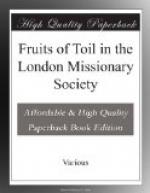When the late Queen took her journey to the sea, large numbers of christians attended the camp on official duty, and, by faithfully observing the Sabbath and holding meetings for worship, afforded numerous opportunities to their heathen companions of hearing the gospel preached and of listening to christian prayers. The impression produced was deep and widespread. When the camp returned to the capital, hundreds of new faces were seen in the churches, and the congregations increased so greatly, that chapel building and enlargement were necessitated on a very extensive scale.
With the reign of her youngest sister, the new Queen, all hesitation on the part of the Government respecting christianity seemed to pass away. The leaders had doubted whether it did not necessarily involve the introduction of purely foreign elements into the general government of the island. But reassured by the steadfast loyalty of the Protestant missionaries, who have adhered strictly to their position as religious teachers, and whose prudent, sober conduct in difficult circumstances the Directors consider deserving of high praise, the nobles, believing that christianity had proved itself a great public blessing, began to accept it heartily for themselves.
Kind messages were sent from the Queen to the missionaries on her accession; with assurances of public protection for all their converts. The diviners and idol keepers, who had been so influential in the palace, were dismissed to country villages. Numerous members of noble families joined the several congregations in the city, and many of the highest rank were baptized. The congregations both in town and country grew larger and larger, and it was most difficult to find them room. Next a law was passed, putting a stop to all official work on the Sabbath-day: and was followed by another law, which directed that Sunday markets should be held on some other convenient day. After full consideration, the Council repealed the ancient law, which forbade the erection of stone buildings within the capital, and had sanctioned only palaces, houses and walls of wood. Such a step may appear to be a trifle. It may seem to be a matter merely of economy, safety, and convenience, whether a people shall build in wood or earth or stone. But the repeal meant more than this. It was a veritable Reform Bill: it swept away old traditions, conservative customs, and those rules and motives of the past which were the buttresses of idolatry, and which had hitherto hindered all public progress. It was a sign that this young nation had entered on a new career of life and thought and happiness.




